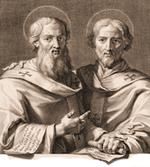Catechism of the Catholic Church
931 Already dedicated to him through Baptism, the person who surrenders himself to the God he loves above all else thereby consecrates himself more intimately to God's service and to the good of the Church. By this state of life consecrated to God, the Church manifests Christ and shows us how the Holy Spirit acts so wonderfully in her. And so the first mission of those who profess the evangelical counsels is to live out their consecration. Moreover, "since members of institutes of consecrated life dedicate themselves through their consecration to the service of the Church they are obliged in a special manner to engage in missionary work, in accord with the character of the institute." 476
932 In the Church, which is like the sacrament- the sign and instrument - of God's own life, the consecrated life is seen as a special sign of the mystery of redemption. To follow and imitate Christ more nearly and to manifest more clearly his self- emptying is to be more deeply present to one's contemporaries, in the heart of Christ. For those who are on this "narrower" path encourage their brethren by their example, and bear striking witness "that the world cannot be transfigured and offered to God without the spirit of the beatitudes." 477
933 Whether their witness is public, as in the religious state, or less public, or even secret, Christ's coming remains for all those consecrated both the origin and rising sun of their life:
For the People of God has here no lasting city, . . . [and this state] reveals more clearly to all believers the heavenly goods which are already present in this age, witnessing to the new and eternal life which we have acquired through the redemptive work of Christ and preluding our future resurrection and the glory of the heavenly kingdom. 478
IN BRIEF:
934 "Among the Christian faithful by divine institution there exist in the Church sacred ministers, who are also called clerics in law, and other Christian faithful who are also called laity." In both groups there are those Christian faithful who, professing the evangelical counsels, are consecrated to God and so serve the Church's saving mission (cf. CIC, can. 207 § 1, 2).
935 To proclaim the faith and to plant his reign, Christ sends his apostles and their successors. He gives them a share in his own mission. From him they receive the power to act in his person.
936 The Lord made St. Peter the visible foundation of his Church. He entrusted the keys of the Church to him. The bishop of the Church of Rome, successor to St. Peter, is "head of the college of bishops, the Vicar of Christ and Pastor of the universal Church on earth" (CIC, can. 331).
937 The Pope enjoys, by divine institution, "supreme, full, immediate, and universal power in the care of souls" (CD 2).
938 The Bishops, established by the Holy Spirit, succeed the apostles. They are "the visible source and foundation of unity in their own particular Churches" (LG 23).
939 Helped by the priests, their co-workers, and by the deacons, the bishops have the duty of authentically teaching the faith, celebrating divine worship, above all the Eucharist, and guiding their Churches as true pastors. Their responsibility also includes concern for all the Churches, with and under the Pope.
940 "The characteristic of the lay state being a life led in the midst of the world and of secular affairs, lay people are called by God to make of their apostolate, through the vigor of their Christian spirit, a leaven in the world" (AA 2 § 2).
941 Lay people share in Christ's priesthood: ever more united with him, they exhibit the grace of Baptism and Confirmation in all dimensions of their personal family, social and ecclesial lives, and so fulfill the call to holiness addressed to all the baptized.
942 By virtue of their prophetic mission, lay people "are called . . . to be witnesses to Christ in all circumstances and at the very heart of the community of mankind" (GS 43 § 4).
943 By virtue of their kingly mission, lay people have the power to uproot the rule of sin within themselves and in the world, by their self-denial and holiness of life (cf. LG 36).
944 The life consecrated to God is characterized by the public profession of the evangelical counsels of poverty, chastity, and obedience, in a stable state of life recognized by the Church.
945 Already destined for him through Baptism, the person who surrenders himself to the God he loves above all else thereby consecrates himself more intimately to God's service and to the good of the whole Church.
Notes:
English Translation of the Cathechism of the Catholic Church for the United States of America © 1997, United States Catholic Conference, Inc.






